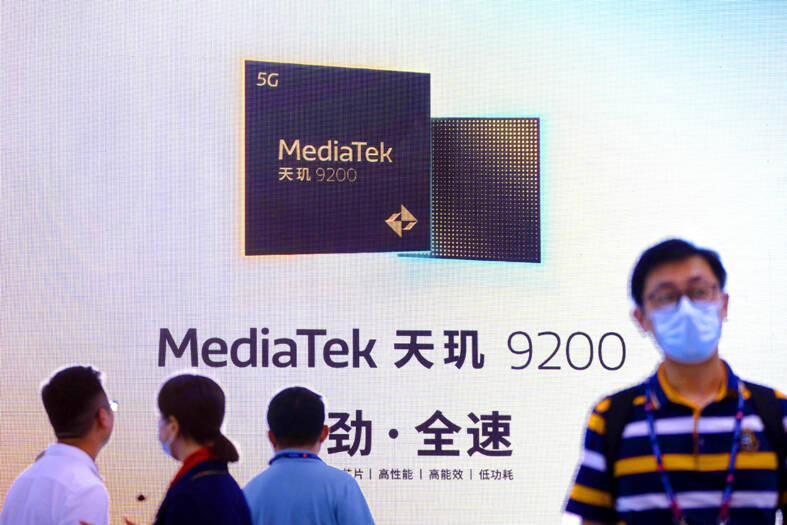MediaTek Inc (聯發科), the world’s biggest supplier of 5G mobile chips, yesterday launched its latest Dimensity 6000 series chipset, seeking to capitalize on growing demand for affordable 5G smartphones in emerging markets including India.
The Hsinchu-based chip designer’s product launch comes as India and Southeast Asian countries have become a new growth area for mobile phone chip suppliers, with growth in 5G phone sales in the region bucking a downward trend in the overall smartphone market.
For example, 5G penetration in India is expected to reach 40 percent this year, compared with 20 percent last year, MediaTek said.

Photo: AP
“As developing markets continue rolling out 5G networks at a rapid pace and operators in developed markets work to finish transitioning consumers from 4G LTE to 5G, there has never been a more vital need for chipsets that cater to the growing number of mainstream mobile devices,” CH Chen (陳俊宏), deputy general manager of MediaTek’s wireless communications business unit, said in a statement.
Global smartphone shipments are expected to drop to 1.1 billion units this year due to high inflation and macroeconomic uncertainty, while 5G penetration worldwide would rise to about 55 percent, the company said.
The first smartphone featuring the Dimensity 6100+ chipset, made with 6-nanometer technology, is to be available next quarter, it said.
MediaTek would also increase its offering of flagship 5G processors as it plans to launch its third-generation flagship system on a chip, the Dimensity 9300 series, later this quarter, it added.
The company on Monday reported that revenue last month grew 21.07 percent sequentially to NT$38.22 billion (US$1.22 billion), but was down 25.1 percent annually.
Second-quarter revenue was NT$98.14 billion, up 2.6 percent from the previous quarter and in line with the firm’s forecast of between NT$91.8 billion and NT$99.5 billion, it said.
The smartphone chip segment was the biggest revenue contributor to MediaTek, making up about 46 percent of revenue in the first quarter, company data showed.
In April, MediaTek said the consumer electronics segment was down due to soaring inflation, adding that it expects mobile phone chip revenue to pick up sometime during the second half of this year.

Vincent Wei led fellow Singaporean farmers around an empty Malaysian plot, laying out plans for a greenhouse and rows of leafy vegetables. What he pitched was not just space for crops, but a lifeline for growers struggling to make ends meet in a city-state with high prices and little vacant land. The future agriculture hub is part of a joint special economic zone launched last year by the two neighbors, expected to cost US$123 million and produce 10,000 tonnes of fresh produce annually. It is attracting Singaporean farmers with promises of cheaper land, labor and energy just over the border.

US actor Matthew McConaughey has filed recordings of his image and voice with US patent authorities to protect them from unauthorized usage by artificial intelligence (AI) platforms, a representative said earlier this week. Several video clips and audio recordings were registered by the commercial arm of the Just Keep Livin’ Foundation, a non-profit created by the Oscar-winning actor and his wife, Camila, according to the US Patent and Trademark Office database. Many artists are increasingly concerned about the uncontrolled use of their image via generative AI since the rollout of ChatGPT and other AI-powered tools. Several US states have adopted

A proposed billionaires’ tax in California has ignited a political uproar in Silicon Valley, with tech titans threatening to leave the state while California Governor Gavin Newsom of the Democratic Party maneuvers to defeat a levy that he fears would lead to an exodus of wealth. A technology mecca, California has more billionaires than any other US state — a few hundred, by some estimates. About half its personal income tax revenue, a financial backbone in the nearly US$350 billion budget, comes from the top 1 percent of earners. A large healthcare union is attempting to place a proposal before

KEEPING UP: The acquisition of a cleanroom in Taiwan would enable Micron to increase production in a market where demand continues to outpace supply, a Micron official said Micron Technology Inc has signed a letter of intent to buy a fabrication site in Taiwan from Powerchip Semiconductor Manufacturing Corp (力積電) for US$1.8 billion to expand its production of memory chips. Micron would take control of the P5 site in Miaoli County’s Tongluo Township (銅鑼) and plans to ramp up DRAM production in phases after the transaction closes in the second quarter, the company said in a statement on Saturday. The acquisition includes an existing 12 inch fab cleanroom of 27,871m2 and would further position Micron to address growing global demand for memory solutions, the company said. Micron expects the transaction to